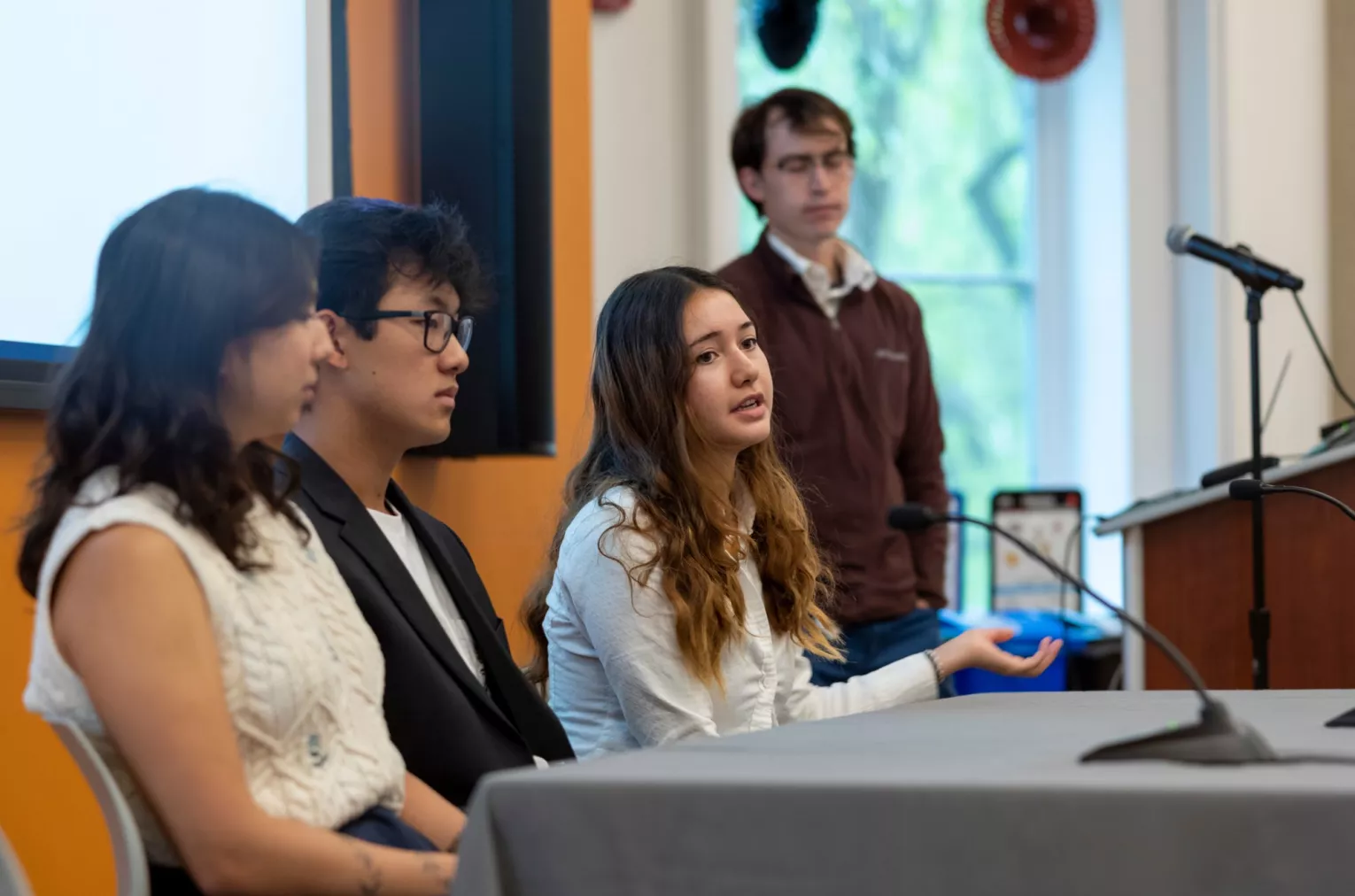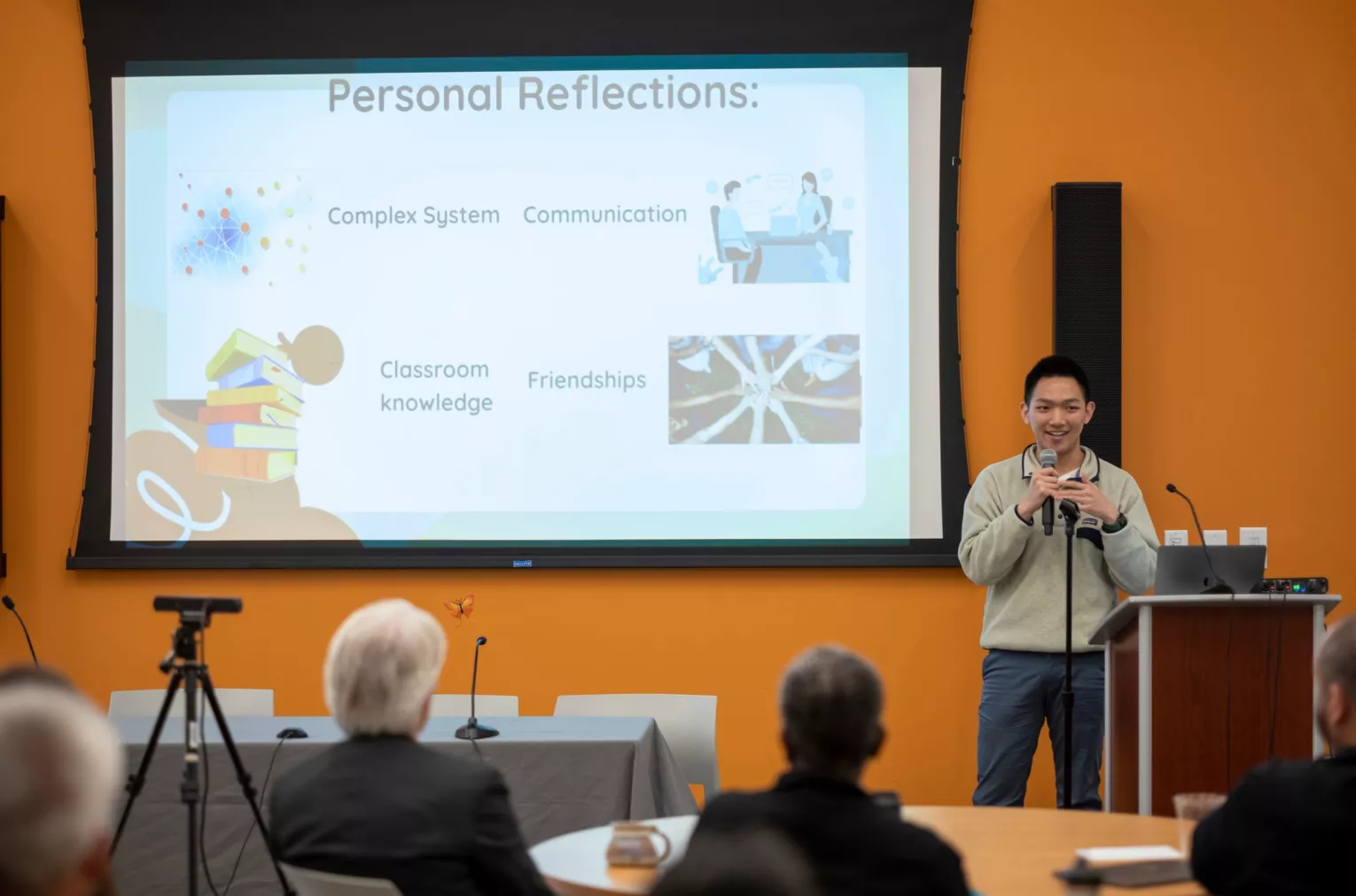The President’s Office, the Office of Sustainability, the Environmental Studies Program, and the Lang Center for Civic and Social Responsibility jointly host the high-impact learning program, The President’s Sustainability Research Fellowship (PSRF).
Since the program’s founding in 2016, our Fellows are doing all we could have asked: redesigning our waste management system, developing a 3-year vision for campus woods stewardship, implementing Swarthmore's internal carbon price, launching behavioral change strategies to reduce greenhouse gas emissions, and creating a system to track sustainability progress across campus. They’re also doing more than we could have imagined. In tackling waste reduction, for instance, Fellows are uniting custodial staff and students by redefining waste as an environmental justice issue. In championing the campus woods, Fellows are connecting faculty and students with grounds and arboretum staff to engage not only the College provost and vice-presidents but also neighboring communities.
Check out the Annual Report from the 2024-2025 academic year here.
Program Description
How do students learn to lead?
In the President’s Sustainability Research Fellowship (PSRF) at Swarthmore College, students learn by leading: by taking stewardship over vital sustainability challenges. The program matches motivated students with small teams of staff and faculty mentors to research, develop, and implement projects in a year-long course and associated internship. With faculty guidance, students conduct wide-ranging research and write reports, proposals, and/or white papers relevant to their sustainability project. Students will hone their skills in collaboration, gain valuable leadership and project management experience, and make meaningful contributions to advancing campus sustainability at Swarthmore and in the surrounding community. No previous environmental study or sustainability experience is required to apply, as the PSRF program seeks to encourage students to bring their unique background and develop multifaceted, creative approaches to making change.

2025-2026 Fellows
| Name | Project | Mentors |
| Alice Coxe '27 | Embodied Carbon | Roderick Wolfson, Senior Planner and Project Manager |
| Cassandra Conklin '26 | Crum Woods Stewardship | Jose Luis Machado, Associate Professor of Ecology |
| Simone Gingerich-Boberg '26 | Crum Wood Stewardship | Jose Luis Machado, Associate Professor of Ecology |
| Emily McClung '26 | Dining Communications | Rich Green, Associate Director of Dining Services |
| Georgie Greene '26 | Environmental Justice and Community Resilience | Giovanna DiChiro, professor of Environmental Studies |
| Grace Chen '26 | Digital Footprint of Libraries | Jordan Landes, Curator of the Friends Historical Library and Emily Higgs-Kopin, Head of Digital Collection Strategy |
| Hayley Harris '27 | Sustainable Procurement | Chris Kane, Director of Procurement |
| Sophia Springer '26 | Farm Feasibility Study | Carr Everbach, Professor of Engineering and Environmental Studies |
| Quaye Agoyo '26 | Carbon Offsets | Melanie Patapis, Climate Action Manager |
| Mahika Shergill '26* | Environmental Justice and Community Resilience | Giovanna DiChiro, Professor of Environmental Studies |
| Ella Peyre '26* | Athletics | Roderick Wolfson, Senior Planner and Project Manager |
| Clara Lee '26* | Lab Waste | Remi Beaulac, Assistant Professor of Chemistry and Biochemistry |
* Denotes returning "Senior Fellow"
Learn more about PSRF
Benefits to Students
- Contribute to improving sustainability on campus and in the surrounding community through a specific, high impact project
- Learn to be an agent for change in a large organization
- Gain valuable project management, communication, and advocacy skills
- Receive ongoing mentorship from faculty, staff, and other members of the community
- Earn two credits (1 credit per semester) for project-based learning. Credits will be awarded through ENVS 089A and B, taught by Environmental Studies faculty, with support from the Director of Sustainability.
- Earn top Swarthmore student wages for 6-10 hours weekly throughout the academic year
- Participate in a cohort of motivated students, supporting one another and solving real-world problems using interdisciplinary approaches
- Present your final projects to the President, senior staff, and the community
Program Expectations
- Enroll in 1-credit course each semester and complete all course requirements. As part of the credit received:
- Participate in weekly seminar (T/Th with written assignments including a case study, a benchmarking study, a mid-project report, and a final report)
- Meet every two weeks throughout the year with a faculty mentor in a specific discipline; produce a literature survey relevant to your project and conduct research and/or analysis as appropriate to the subject
- Work on your project for 6-10 hours per week through the academic year, including weekly meetings with a staff mentor, plus additional meetings as required by the project
- Attend a launch meeting in the fall semester; present initial work mid-year to the extended PSRF community; present final projects at the end of the year at a public meeting




